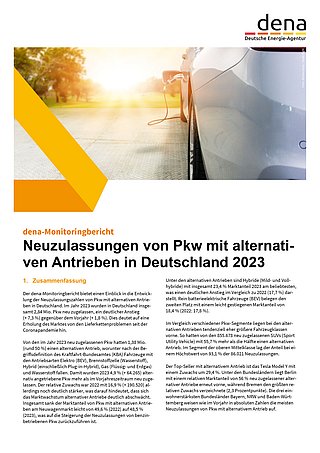Target quota for electric cars at risk of being missed by 2030
Low momentum in the market development of passenger cars with alternative drive systems: Only 5 per cent more new registrations in 2023 – target quota for electric cars at risk of being missed by 2030
-
 © HoffotografenSebastian Boie
© HoffotografenSebastian BoieSenior Expert, Communications T: +49 30 66 777 - 168 sebastian.boie(at)dena.de
Berlin, Germany, 29 April 2024. A total of 2.84 million new cars were registered in Germany in 2023, which shows a significant increase on the previous year. This growth continued in the first months of 2024 and indicates a recovery in the automotive market, which had previously suffered from the effects of supply chain problems as a result of the Covid-19 pandemic.
At 1.38 million vehicles, almost half of all new registrations in 2023 had a hybrid, fully electric or fuel cell-based drive system. These alternative drive types thus achieved an increase of 5 per cent year on year. However, the pace of market development has slowed compared to 2022 (17 per cent). Battery-electric cars are of central importance for achieving the energy efficiency and climate protection targets in the transport sector. The number of registrations of battery-electric cars even increased in 2023 despite the premature termination of federal funding measures in November 2023, yet they only took second place among alternative drive systems behind hybrids. The registration figures in the first quarter of 2024 confirm the trends from 2023 that total registrations are rising and growth in the market share of alternative drive types is slowing.
‘The range of electric vehicles is increasing, but high purchase costs and a lack of charging options are still factors that often cause consumers to turn to other alternatives, such as hybrids, or even back to petrol cars. The expansion of the charging infrastructure and information services, for example, about operating costs, are therefore particularly important for building confidence in the new drive types,’ says Kristina Haverkamp, Managing Director of dena.
With the average growth rate of 11 per cent in 2023, only around 7 million electric cars would be put on the road by 2030, thus falling well short of the target of 15 million new registrations for electric cars. The growth rate would have to return to the original level from 2022 of more than 32 per cent for the target to be achieved. In the coming years, the carbon price in particular, which will be shown to buyers on the newly introduced car label, will play a decisive role in helping the market regain its former strength and increase the economic efficiency of electric vehicles. In turn, manufacturers are obliged to increase their sales quotas for electric cars on the basis of the EU fleet-wide carbon emission targets. Progress in the expansion of the public charging infrastructure could provide confidence, with the ratio of electric cars per charging point improving in 2023.
You can find more details in dena’s current monitoring report entitled ‘New registrations of alternative drive systems in Germany 2023’, a publication of the dena information service for car mobility, at https://alternativ-mobil.info. You can find graphics related to the report here.
About Deutsche Energie-Agentur (dena) – the German Energy Agency
The German Energy Agency (dena) is a centre of excellence for the applied energy transition and climate protection. Dena studies the challenges of building a climate-neutral society and supports the German government in achieving its energy and climate policy objectives. Since its founding in 2000, dena has worked to develop and implement solutions and bring together national and international partners from politics, industry, the scientific community and all parts of society. Dena is a project enterprise and a public company owned by the German federal government. dena’s shareholders are the Federal Republic of Germany and dena itself.


![[Translate to English:]](/fileadmin/_processed_/2/e/csm_250318_JDENA_PHT021_01_cc4dc7d460.jpg)
